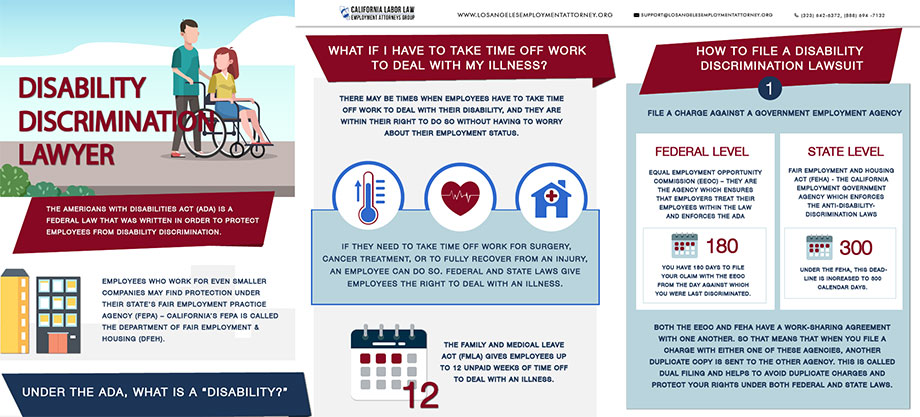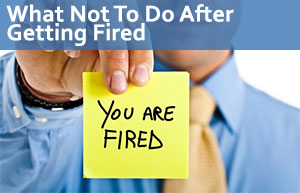SPEAK WITH A LAWYER TODAY
Disability Discrimination Lawyer
California Disability Discrimination Lawyer
 When it comes to business decisions, it is of the utmost importance that employers take into consideration only the employee’s or applicant’s qualifications and ability to perform the essential job functions of the occupation for which they either do or are applying. Unfortunately, some employers wish to look beyond the objectivity of an employee’s abilities and look at the employee through the lenses of prejudice. They base their employee’s ability on things like race, sex, nationality, religion, sexual orientation, genetic information, and even disabilities. Whether these prejudices are malicious or not, intentional or not, it still leaves the employee on the wrong side of the employment pool because of the negative effect that discrimination has on one’s life.
When it comes to business decisions, it is of the utmost importance that employers take into consideration only the employee’s or applicant’s qualifications and ability to perform the essential job functions of the occupation for which they either do or are applying. Unfortunately, some employers wish to look beyond the objectivity of an employee’s abilities and look at the employee through the lenses of prejudice. They base their employee’s ability on things like race, sex, nationality, religion, sexual orientation, genetic information, and even disabilities. Whether these prejudices are malicious or not, intentional or not, it still leaves the employee on the wrong side of the employment pool because of the negative effect that discrimination has on one’s life.

It is unlawful for an employer to discriminate against their employees for characteristics which are innate to their being.
Discrimination occurs when an employer (or fellow employee) singles out an employee, or employees, and treats them unjustly or gives them prejudicial treatment on things like employment, promotions, terminations, benefits, and other terms and conditions that are a part of their employment.
The Americans with Disabilities Act (ADA) is a federal law that was written in order to protect employees from disability discrimination in every single facet of one’s employment, from hiring, termination, and everything else in between. This applies to private employers who have at least 15 workers under their employment; employees who work for even smaller companies may find protection under their state’s Fair Employment Practice Agency (FEPA) – California’s FEPA is called the Department of Fair Employment & Housing (DFEH). The ADA’s definition of discrimination is broad an encapsulates many possible issues that an employee may have which cannot be used against the employee to justify unequal treatment or dismissal.
If you believe that you have been a victim of disability discrimination, and have received unjust treatment or even terminated, you may have the grounds to file a lawsuit against your employer for disability discrimination. We at the California Labor Law Employment Attorneys Group, located in Los Angeles, help people who have been wronged by their employer. The California Labor Law Employment Attorneys Group’s disability discrimination attorneys help people like you every single day and answer people’s questions regarding disability discrimination to help them get the damages to which they are entitled. Examples of such questions include:
- How to sue for disability discrimination?
- Can you get fired for having a disability?
- Can an employer make hiring decisions based on disability?
- Can my boss discriminate against me for a disability that I have?
- My employer fired me because of my disability. Is this wrongful termination? Can I sue?
- An employer did not hire me because of my disability: Can they legally do that?
- What can a work disability attorney in Los Angeles do for me?
- Can an employment disability discrimination lawyer help me recover damages?
If you want to hire a disability discrimination lawyer in Los Angeles, here are a few things you should know about disability discrimination and how to properly sue your employer if you believe that you have been a victim of disability discrimination.
Under the ADA, What Is a “Disability?”

The ADA also protects employees from disabilities if they have a record or history of disability, like a history of heart disease, for example. The employer is also not allowed to assume that you have a disability and base decisions on that assumption – whether it is true or not. So if you have limp that does not hinder your ability to walk, it is considered discrimination if your employer assumes that you can’t do a job that considers walking, even if they have “good” intentions.

What is an Essential Job Function?
What is Reasonable Accommodation?
What If I Have to Take Time Off Work to Deal With My Illness?
How to File a Disability Discrimination Lawsuit
You simply cannot slap a work disability discrimination lawsuit on your employer’s desk without going through the proper procedure. We explain how to properly file a lawsuit against your employer if you believe that you have been a victim of disability discrimination.
Before you can sue your employer for discriminating against your disability, you must first file a charge against a government employment agency. You can either file your charge at the federal or state level. The federal agency with whom you file your charge is Equal Employment Opportunity Commission (EEOC) – they are the agency which ensures that employers treat their employees within the law and enforces the ADA. If your state has the same anti-discrimination laws as the federal law, you may file with your state’s employment agency. The California employment government agency which enforces the anti-disability-discrimination laws is called the California Fair Employment and Housing Act (FEHA) of 1959 protects employees from discrimination of all sorts, including disability in Los Angeles, and every other CA city.
Both the EEOC and FEHA have a work-sharing agreement with one another. So that means that when you file a charge with either one of these agencies, another duplicate copy is sent to the other agency. This is called dual filing and helps to avoid duplicate charges and protect your rights under both federal and state laws. Under the EEOC, if you believe that you have been victim of disability discrimination you have 180 days to file your charge from the day you received discrimination for being disabled. If the discrimination is ongoing, you have 180 days from the day you last received discrimination. Under the FEHA, this deadline is increased to 300 calendar days. After you file your charge, the office will further investigate and determine whether or not you have the right to sue your employer for discrimination. You can then request a “right-so-sue” letter which is like a green light from the agencies which gives you the power to take your employer to court. It is recommended that you only request this letter once you are ready to file suit because you only have ninety (90) days from the day you receive your letter.
You can either make your claim in-person at one of the EEOC/FEHA offices or through the mail. If you want to go in person, make sure to read the office’s policy on walk-ins. Bring any important documentation which helps prove your case.
You can also send your charge through the mail. If you want to send it through the postal service, you need to include a few things inside of your envelope:
- Your name, address, and telephone number;
- The name, address, telephone number of your employer;
- A brief description of the events which transpired which makes you believe you were a victim of disability discrimination, and the type of discrimination that occurred;
- The date(s) of the occurrence, and any witnesses;
- The number of workers under employment at your company;
- Your signature – the government agency cannot conduct an investigation without your signature.
Free Consultation and Zero Fee Guarantee
Client Review
“The people at California Labor Law where professional and and caring. They helped me in every way possible. They calling me periodically to see if there is any other need. Susanna and Desirae personally went over and above the services I ask for. Thank You! If you need a law firm I recommend California Labor Law and Employment Attorneys Group.”
– Mary Withers


OUR Guarantee
Pay NO FEES until we win your Employment case.
100% FREE CASE CONSULTATION

Client Review
California Labor Law Employment Attorneys Group
5 out of 5
This can be an ugly world and it is nice knowing lawyers such as Daniel to help people right a wrong when they have suffered at the hands of their employer. Daniel is one of the good guys out there and I strongly recommend his skills as an employment lawyer.
– Hoagland Stubbs